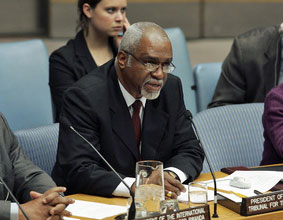| Press Release |
PRESIDENT
|
| (Exclusively for the use of the media. Not an official document) |
|
The Hague, 3 December 2009
NJ/MOW/1342e
President Robinson’s Address Before the Security Council
 |
| ICTY President Judge Patrick Robinson |
In today’s address to the UN Security Council, the Tribunal’s President, Judge Patrick Robinson, highlighted the organisation’s successes and key challenges ahead as part of his report on the status of the Tribunal’s completion strategy.
The President informed the Security Council that since his last address to the Security Council in June 2009, the Tribunal has continued to focus its energies on completing its work as expeditiously as possible. Of the ongoing case load, 24 accused are on trial and 13 accused have appeals pending. Only one accused, Zdravko Tolimir, is at the pre-trial stage awaiting the commencement of his trial, which is expected on 17 December 2009. According to the latest estimations, all trials are expected to be completed by mid-2011, with the exception of that of Radovan Karadžić, which is expected to finish in late 2012. The appeal in the Karadžić case would be completed by February 2014 and all other appeals in 2013.
Whilst the President reassured the Security Council that all necessary measures were being taken to expedite proceedings, he stressed that the continued flight from justice of Ratko Mladić and Goran Hadžić remains a serious hurdle for the completion of the Tribunal’s mandate. He warned that failure to arrest them would “tarnish the Security Council’s historic contribution to peace-building in the former Yugoslavia.” He also stressed that their immediate arrest would obviate the need for a residual trial function for the ICTY.
The President also requested the assistance of the Security Council with regards to the question of staff retention. The Tribunal loses, on average, one staff member per working day to more secure employment. “The reality of the situation is that there is a very real risk to the Tribunal’s ability to conduct its work as expeditiously and fairly as possible during the remaining years of its mandate,” President Robinson said. He urged the Security Council to exercise foresight by assisting the Tribunal with measures to retain its qualified staff.
The President reiterated his call for a claims commission by which the victims of crimes committed during the wars in the former Yugoslavia could seek compensation for their injuries: “Justice is not only about punishing perpetrators, but also about restoring dignity to victims by ensuring that they have concrete means to rebuild their lives,” he said.
The President also reported on the extensive work undertaken by the Tribunal towards its transformation as a residual mechanism. He particularly looked at “the mammoth undertaking” to declassify, to the greatest extent possible, all the records of the Tribunal. The President informed the Security Council that significant resources are required to complete this task, which involves reviewing all confidential hearings, filings, exhibits and witnesses and contacting the relevant interlocutors before a decision is made to declassify a document. “The more material that is made public, the less necessity there will be for national jurisdictions to petition the residual mechanism for access to confidential materials and for judges to issue decisions on those requests,” he said.
The President also briefed the Security Council on the work which has been undertaken to strengthen the national jurisdictions in the former Yugoslavia. He referred to the recently published report “Supporting the Transition Process: Lessons Learned and Best Practices in Knowledge Transfer”, which evaluates the needs of the domestic judiciaries in the region. Together with the OSCE and UNICRI, the Tribunal is now preparing an ambitious project to guarantee that the national justice systems have the capacity to deal with their growing war crimes caseload.
In relation to this, the President informed the Security Council of a conference that the Tribunal will convene in February 2010 in The Hague, the purpose of which is to consult stakeholders and generate interest and support for the Tribunal’s legacy strategy in the former Yugoslavia. Following the conference, the Tribunal will prepare a report setting out its comprehensive legacy strategy.
In closing, the President reiterated that the Tribunal is dedicated to completing the work it has been entrusted with, so that peace, justice, and reconciliation may prevail in the region of the former Yugoslavia. The President re-emphasised that, in order for this goal to be achieved, the two remaining fugitives must be brought to justice. The President also urged the Security Council to actively work on finding ways to retain the Tribunal’s staff as they remain critical to the Tribunal’s capacity to expedite its operations.
The President and Prosecutor submit to the Security Council their assessments on the progress made towards implementation of the completion strategy of the Tribunal in accordance with Resolution 1534. The reports, filed every six months, set out the measures that have been taken and that remain to be taken to meet the completion, including the transfer of cases to competent national jurisdictions.
Additionally, the President submits an Annual Report to the UN Security Council and General Assembly. The Annual Report, usually submitted in November, covers the twelve-month period of 1 August - 31 July and includes an overview of activities involving all sections of the Tribunal.
Since its inception 16 years ago, the Tribunal has indicted 161 persons for war crimes committed on the territory of the former Yugoslavia. The proceedings against 121 individuals have been completed. Only two indictees remain at large – Ratko Mladić and Goran Hadžić.
*****
The full text of the President's speech can be found at:
In English
In French
The latest Completion Strategy Report of the President can be found at:
In English
In French
*****
International Criminal Tribunal for the former Yugoslavia
For more information, please contact our Media Office in The Hague
Tel.: +31-70-512-8752; 512-5343; 512-5356 Fax: +31-70-512-5355 - Email: press [at] icty.org

